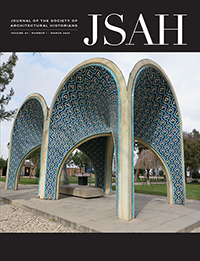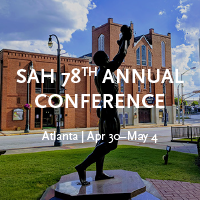-
Membership
Membership
Anyone with an interest in the history of the built environment is welcome to join the Society of Architectural Historians -
Conferences
Conferences
SAH Annual International Conferences bring members together for scholarly exchange and networking -
Publications
Publications
Through print and digital publications, SAH documents the history of the built environment and disseminates scholarshipLatest Issue:

-
Programs
Programs
SAH promotes meaningful engagement with the history of the built environment through its programsMember Programs
-
Jobs & Opportunities
Jobs & Opportunities
SAH provides resources, fellowships, and grants to help further your career and professional life -
Support
Support
We invite you to support the educational mission of SAH by making a gift, becoming a member, or volunteering -
About
About
SAH promotes the study, interpretation, and conservation of the built environment worldwide for the benefit of all
SAH Announces Inaugural Eduard F. Sekler Talk
Oct 9, 2018
by
SAH News
The Society of Architectural Historians is pleased to announce the inaugural Eduard F. Sekler Talk, established this year by a gift from Patricia Sekler in honor of her late husband, architectural historian and longtime SAH member Eduard F. Sekler (1920–2017). The Sekler Talk will bring a notable speaker to the SAH conference each year to address a topic related to architecture, urbanism, preservation, the state of the field of architectural history, or a combination thereof.
Distinguished architectural historian, writer, and educator Joan Ockman will deliver the 2019 Sekler Talk at the SAH 72nd Annual International Conference in Providence, Rhode Island.
“We are grateful for the Sekler gift and memorial lecture, which honors a distinguished, longtime SAH member who mentored many young scholars through their dissertation work at Harvard,” said Pauline Saliga, executive director of SAH.
2019 Eduard F. Sekler Talk
 Joan Ockman, “On the Future History of Modern Architecture”
Joan Ockman, “On the Future History of Modern Architecture”
Thursday, April 25, 8:00–8:20 pm
First Baptist Church Meeting House
75 N Main St., Providence, Rhode Island
(Open to conference attendees only)
“The past is a foreign country.” So it seems at times from the perspective of the early twenty-first century. An epoch of incessant technological innovation, global restructuring, climate change, and fallout from postmodernism has shattered our understanding and interpretation of what we used to call modern architecture. In schools of architecture today, the presence of the future is much stronger than the presence of the past. As the twentieth century recedes, does the term “modernism” still have any meaning? How to name and frame the period we are in now?
About Joan Ockman
 Joan Ockman is an architectural historian, critic, and educator. Currently Distinguished Senior Lecturer at the University of Pennsylvania School of Design and Visiting Professor at Cooper Union School of Architecture and Cornell AAP/NYC, she served as director of the Temple Hoyne Buell Center for the Study of American Architecture at Columbia University from 1994 to 2008 and as a member of the faculty of Columbia’s Graduate School of Architecture, Planning and Preservation for over two decades. She has also held teaching appointments at Harvard, Yale, and the Berlage Institute.
Joan Ockman is an architectural historian, critic, and educator. Currently Distinguished Senior Lecturer at the University of Pennsylvania School of Design and Visiting Professor at Cooper Union School of Architecture and Cornell AAP/NYC, she served as director of the Temple Hoyne Buell Center for the Study of American Architecture at Columbia University from 1994 to 2008 and as a member of the faculty of Columbia’s Graduate School of Architecture, Planning and Preservation for over two decades. She has also held teaching appointments at Harvard, Yale, and the Berlage Institute.
She began her career at the Institute for Architecture and Urban Studies in New York in the mid–1970s, where she was an editor of Oppositions journal, Oppositions Books, and other publications. Her edited or co-authored books include MAS: The Modern Architecture Symposia, 1962–1966. A Critical Edition (2014), Architecture School: Three Centuries of Educating Architects in North America (2012), Architourism: Authentic, Exotic, Escapist, Spectacular (2005), Out of Ground Zero: Case Studies in Urban Reinvention (2002), The Pragmatist Imagination: Thinking about Things in the Making (2000), and the award-winning Architecture Culture 1943–1968: A Documentary Anthology (1993).
The recipient of grants and fellowships from the Graham Foundation, the International Center for Advanced Studies at New York University, and the Mellon Humanities, Urbanism, and Design Initiative, she was honored for Collaborative Achievement by the American Institute of Architects in 2003 and was named a Fellow of the Society of Architectural Historians in 2017. A collection of her essays, Architecture Among Other Things, is due out next year.
About Eduard F. Sekler
 Eduard F. Sekler, an architectural historian who became the first director of Harvard’s renowned Carpenter Center for the Visual Arts, was born in Vienna in 1920 and earned a degree in architecture at the Technische Hochschule in Vienna (now the Vienna University of Technology). He moved to London to study with the legendary art historian Rudolf Wittkower and obtained a PhD in art history at the Warburg Institute (now part of the University of London’s School of Advanced Study). While in London, he also studied with Jaqueline Tyrwhitt at the School of Planning and Research for Regional Development.
Eduard F. Sekler, an architectural historian who became the first director of Harvard’s renowned Carpenter Center for the Visual Arts, was born in Vienna in 1920 and earned a degree in architecture at the Technische Hochschule in Vienna (now the Vienna University of Technology). He moved to London to study with the legendary art historian Rudolf Wittkower and obtained a PhD in art history at the Warburg Institute (now part of the University of London’s School of Advanced Study). While in London, he also studied with Jaqueline Tyrwhitt at the School of Planning and Research for Regional Development.
In 1955, he was invited to join the faculty at Harvard University by Josep Lluís Sert, dean of the Graduate School of Design. He spent the rest of his career at Harvard, eventually retiring as Osgood Hooker Emeritus Professor of Visual Art and Emeritus Professor of Architecture.
A longtime, active member of the Society of Architectural Historians, Sekler joined in 1958 and served two terms as a director of SAH (1963–1966 and 1970–1973). He also served on the local planning committee for the Society’s 1969 annual conference held in Boston.
The author of Wren and His Place in European Architecture (1956); Le Corbusier at Work: The Genesis of the Carpenter Center for the Visual Arts, with William Curtis, 1978, and Josef Hoffmann: The Architectural Work, published in English, 1985, Sekler had a deep understanding of the European architectural tradition. Sekler’s eminence in his field was reflected in two collections of essays: Das Bauwerk und die Stadt/The Building and the Town, Essays for Eduard F. Sekler, edited by Wolfgang Böhm (1994) and Form, Modernism, and History: Essays in Honor of Eduard F. Sekler, edited by Alexander von Hoffman (1996).
Top image: View of Modern Architecture: International Exhibition at the Museum of Modern Art, New York, February 9–March 23,1932. Museum of Modern Art Archives, MA.262

